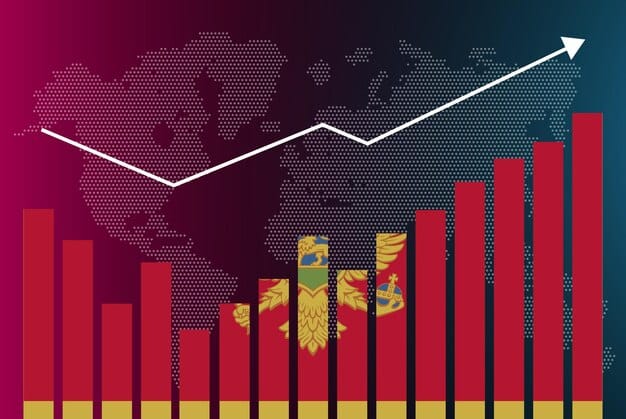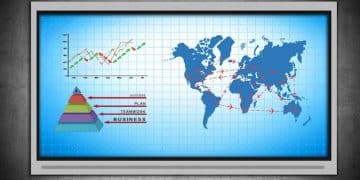Consequences of a Weak WTO for the US: Economic & Geopolitical Impacts

The potential consequences of a weaker World Trade Organization (WTO) for the US include increased trade barriers, reduced export opportunities, and a decline in the rules-based international trading system, potentially leading to economic instability and geopolitical tensions.
The **potential consequences of a weaker World Trade Organization for the US** are far-reaching and complex, affecting not only its economic interests but also its geopolitical standing on the global stage. As the primary arbiter of international trade disputes and the enforcer of trade rules, the WTO’s diminishing influence could trigger a cascade of negative effects for the US.
Understanding the World Trade Organization’s Role
The World Trade Organization plays a crucial role in the global economy. It provides a framework for negotiating and formalizing trade agreements between nations, aiming to reduce trade barriers and create a more level playing field for international commerce. Let’s explore its core functions and significance.
Key Functions of the WTO
The WTO serves several vital functions that contribute to global economic stability and growth. These functions include:
- Setting and enforcing international trade rules.
- Providing a forum for trade negotiations and dispute resolution.
- Promoting transparency and predictability in trade policies.
- Offering technical assistance and training to developing countries.
Significance for the Global Economy
The WTO’s existence is crucial for the global economy as it fosters certainty and predictability in trade relations. This in turn reduces the risk of trade wars and protectionist measures. The organization’s dispute resolution mechanism allows countries to address trade grievances peacefully and legally, rather than resorting to unilateral actions that could harm the entire system.

In conclusion, the WTO acts as a cornerstone of the modern global economy, facilitating trade, resolving disputes, and promoting economic cooperation among nations. A weaker WTO threatens these critical functions and introduces significant uncertainty into international trade relations.
Increased Trade Barriers and Tariffs
One of the most immediate and tangible consequences of a weaker WTO is the potential for increased trade barriers and tariffs. Without the WTO’s enforcement mechanisms, countries may feel less constrained in imposing protectionist measures to shield domestic industries.
The Rise of Protectionism
Protectionism involves implementing policies that restrict or discourage imports to protect domestic industries from foreign competition. These policies often include:
- Higher tariffs on imported goods.
- Quotas limiting the quantity of imports.
- Subsidies for domestic producers.
Impact on US Consumers and Businesses
Increased trade barriers can have several negative impacts on US consumers and businesses. Higher tariffs raise the cost of imported goods, leading to higher prices for consumers. Businesses that rely on imported raw materials or components may also face increased costs, reducing their competitiveness in global markets.
Furthermore, retaliatory tariffs imposed by other countries can harm US exporters, reducing their access to foreign markets and impacting their profitability. This can lead to job losses in export-oriented industries and overall economic slowdown.
In conclusion, a weaker WTO could unleash a wave of protectionist measures, harming US consumers, businesses, and the overall economy by disrupting established trade relationships and increasing costs.
Reduced Export Opportunities for the US
A key benefit of the WTO is its role in opening foreign markets to US exports. Through trade agreements and negotiations, the WTO has helped reduce barriers that previously limited US companies’ access to international customers.
WTO’s Role in Market Access
The WTO has facilitated market access for US exporters by:
- Negotiating the reduction or elimination of tariffs on US goods and services.
- Establishing rules that prevent discriminatory treatment of US products in foreign markets.
- Creating a dispute resolution mechanism to address unfair trade practices.
Potential Losses for US Exporters
If the WTO’s influence diminishes, US exporters could face numerous challenges. Foreign countries may impose new tariffs or non-tariff barriers on US goods, making them less competitive. Without the WTO’s dispute resolution mechanism, US companies may have fewer avenues to challenge unfair trade practices.

This could lead to reduced export volumes, lower revenues for US companies, and job losses in export-oriented industries. Small and medium-sized enterprises (SMEs), which often lack the resources to navigate complex trade barriers, may be particularly vulnerable.
In summary, a weaker WTO could significantly reduce export opportunities for the US, harming its economy and undermining the competitiveness of its businesses in global markets.
Weakening of the Rules-Based International Trading System
The WTO is the cornerstone of the rules-based international trading system, which promotes stability, predictability, and fairness in global commerce. Its weakening could lead to a fragmentation of this system, with countries increasingly relying on bilateral agreements and unilateral actions.
Importance of a Rules-Based System
A rules-based trading system offers several advantages:
- It ensures that all countries, regardless of size or economic power, are subject to the same rules and obligations.
- It reduces uncertainty and promotes transparency in trade relations.
- It provides a mechanism for resolving disputes peacefully and legally.
Shift Towards Bilateralism and Unilateralism
If the WTO’s influence fades, countries may increasingly turn to bilateral trade agreements, which are negotiated between two nations. While bilateral agreements can offer some benefits, they can also lead to a fragmented and inconsistent trading system. They may also favor larger, more powerful countries, which have greater bargaining power.
Unilateralism, where countries take trade actions without consulting or coordinating with others, could also become more prevalent. This could lead to trade wars and retaliatory measures, disrupting global supply chains and harming the world economy.
In conclusion, a weaker WTO threatens the rules-based international trading system, potentially leading to a more chaotic and unpredictable environment for global commerce.
Impact on US Geopolitical Influence
The WTO is not just an economic organization; it also plays a significant role in US geopolitical influence. By shaping the rules of international trade, the WTO helps the US advance its strategic interests and promote its values on the global stage.
WTO as a Tool for US Foreign Policy
The WTO has served as a tool for US foreign policy in several ways:
- It allows the US to promote free trade and open markets, which it views as essential for global prosperity and stability.
- It provides a forum for the US to engage with other countries on trade issues, strengthening diplomatic relationships.
- It enables the US to counter the influence of rival powers by promoting a rules-based system that limits their ability to use trade as a political weapon.
Emergence of Alternative Trade Frameworks
If the WTO weakens, other countries may seek to establish alternative trade frameworks that exclude the US or challenge its leadership. This could undermine US influence and create new geopolitical challenges.
For instance, China has been actively promoting its own trade initiatives, such as the Regional Comprehensive Economic Partnership (RCEP), which includes several major economies in Asia but excludes the US. These initiatives could give China greater influence over regional trade and economic policies.
In summary, a weaker WTO could diminish US geopolitical influence and create opportunities for rival powers to challenge its leadership in the global arena.
Effects on Developing Countries
The WTO’s weakening would have particularly profound effects on developing countries. These nations often rely on the WTO to provide a level playing field in international trade and to protect them from unfair practices by larger economies.
WTO’s Role in Supporting Developing Nations
The WTO provides several forms of support to developing countries:
- Special and differential treatment, which allows them to implement trade agreements more gradually and provides them with technical assistance.
- A dispute resolution mechanism that enables them to challenge unfair trade practices by developed countries.
- Increased access to developed country markets through trade preferences and reduced tariffs.
Increased Vulnerability to Unfair Trade Practices
If the WTO’s influence diminishes, developing countries could become more vulnerable to unfair trade practices by larger economies. Without the WTO’s dispute resolution mechanism, they may have little recourse against protectionist measures or discriminatory treatment.
This could hinder their economic development and perpetuate poverty, as they struggle to compete in global markets without the protection and support of the WTO. It could also exacerbate income inequality and social instability in these countries.
In conclusion, a weaker WTO would disproportionately harm developing countries, undermining their economic progress and increasing their vulnerability to unfair trade practices.
| Key Point | Brief Description |
|---|---|
| 🛑 Trade Barriers | Increased tariffs and protectionism harm US consumers and businesses. |
| 📉 Export Losses | US exporters face reduced market access and competitiveness worldwide. |
| 🌍 Geopolitical Impact | Diminished US influence as alternative trade frameworks emerge. |
| 🌱 Developing Nations | Increased vulnerability to unfair practices, hindering their economic growth. |
Frequently Asked Questions
▼
The WTO primarily works to regulate international trade by establishing rules and settling disputes between member countries, promoting fair and predictable trade practices.
▼
A weaker WTO means that trade disputes are less likely to be resolved fairly and efficiently, leading to potential trade wars and economic instability among nations.
▼
If the WTO’s influence declines, countries might resort to bilateral agreements or regional trade blocs, aiming to secure advantages tailored to their specific economic or political interests.
▼
Some argue a weaker WTO allows the US to pursue more aggressive trade policies, but this approach risks alienating allies and destabilizing global trade relations.
▼
The US can adapt by diversifying its trade partnerships and focusing on domestic competitiveness, but it will then need strong diplomatic efforts to maintain economic stability.
Conclusion
In conclusion, the potential consequences of a weaker World Trade Organization for the US are multifaceted and significant. From increased trade barriers and reduced export opportunities to the weakening of the rules-based international trading system and the diminishing of US geopolitical influence, the stakes are high. While the US may seek to navigate this changing landscape through bilateral agreements and unilateral actions, the long-term stability and prosperity of the global economy depend on a strong and effective multilateral trading system.





